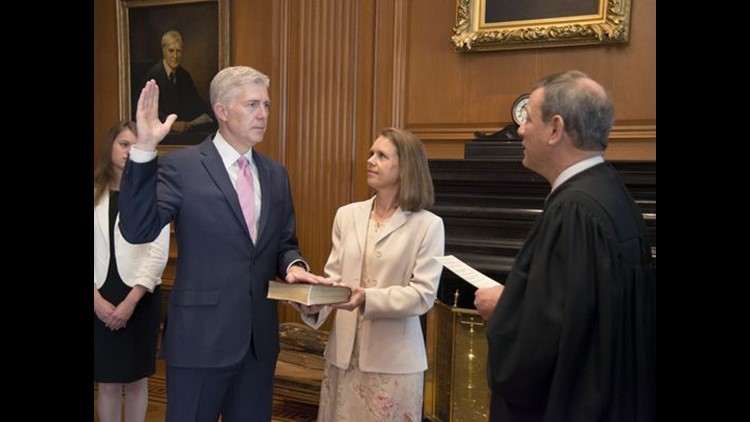It's Justice Gorsuch now.
Neil Gorsuch was sworn in as the 113th justice in the history of the Supreme Court on Monday — but more importantly, as the ninth justice who will bring the court back to full strength after 14 months in the wilderness.
Chief Justice John Roberts did the first set of honors in a private ceremony in the justices' conference room, where Gorsuch took his judicial oath, his hand on a family Bible held by his wife, Louise. All the current justices were in attendance, along with most of their spouses. Also present were Gorsuch's two daughters, as well as the widow and a son of the late Justice Antonin Scalia, whose seat Gorsuch will take.
Two hours later at the White House, Gorsuch took his constitutional oath as a federal employee from Justice Anthony Kennedy, the longest-serving current justice, who employed Gorsuch as a law clerk nearly a quarter-century ago. President Trump, who nominated Gorsuch on Jan. 31, introduced Gorsuch to a supportive crowd in the Rose Garden.
Then the newest, youngest (at 49) member of the court can get to work, and he faces a heavy workload. There are cases to be heard in the next two weeks, including an important one on the separation of church and state. There are petitions to consider, which could lead to new cases next term on guns, voting rights and same-sex marriage. And there are cases already heard that might be deadlocked at 4-4 in which Gorsuch could be asked to cast the deciding vote after a rehearing.
Gorsuch was confirmed by the Senate, 54-45, on Friday after a contentious few days, during which Democrats blocked consideration of his nomination by using the minority party's power to filibuster. Republicans got around the roadblock by changing the Senate's rules to eliminate the 60-vote threshold needed to bring high court nominations to the floor.
The Senate action followed four days of hearings before the Senate Judiciary Committee last month, during which Gorsuch frustrated Democrats by avoiding direct answers to questions about past, present and future cases. The committee voted 11-9 along party lines to advance his nomination.
There would not have been a Justice Gorsuch had it not been for last year's standoff between President Obama and Senate Republicans over the former president's nomination of federal appeals court Judge Merrick Garland to succeed Scalia. Republicans refused even to give Garland a hearing, taking their chances on the November election, and Trump's upset victory over Hillary Clinton kept the seat in conservatives' hands.
In most ways, Gorsuch's résumé screams Supreme Court justice: Degrees from Columbia University, Harvard Law School and the University of Oxford. Prestigious Supreme Court clerkships for Justices Byron White — the first justice from Colorado — and Kennedy. Law firm partner. Justice Department official. A decade on the U.S. Court of Appeals for the 10th Circuit.
But as an acolyte of Scalia whose rulings have skewed conservative on most issues, Gorsuch picked up nearly unanimous opposition from Democrats and their liberal allies, who were willing to give up filibuster rights now rather than waiting for a potential second Trump nomination. That prospect — to be triggered, perhaps, by Kennedy's retirement in the near future — would give Republicans a chance to move the court more firmly to the right.
Gorsuch will begin work immediately, armed with law clerks who previously worked for him on the 10th Circuit. He faces at least three categories of cases — past, present and future:
- Any cases the court already has heard this term in which the justices were equally divided could be reconsidered so that Gorsuch can cast the deciding vote. Those could include cases ranging from a fair housing dispute in Miami to a cross-border shooting on the Mexican border in Arizona.
- The term's last set of cases to be heard later this month includes a potential blockbuster pitting a Lutheran church in Missouri against the state, which denied its application for funding to replace a playground surface over the issue of church-state separation. The oral argument has been delayed for months, signifying a likely deadlock among the eight justices.
- Petitions from challengers seeking to have their cases heard in the 2017 term that begins in October include a potpourri of contentious issues, including whether concealed guns can be carried in public, whether states can further restrict voting rights, and whether merchants with religious objections can refuse to participate in same-sex marriage ceremonies.
The latter case has been on the court's petition calendar for months without an order being issued. That could mean one or more justices are writing dissents from the court's decision against hearing the case, or that the justices are waiting for Gorsuch's views on the matter.



